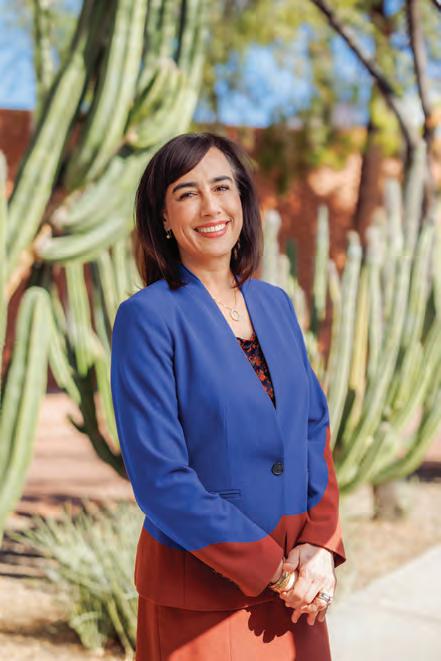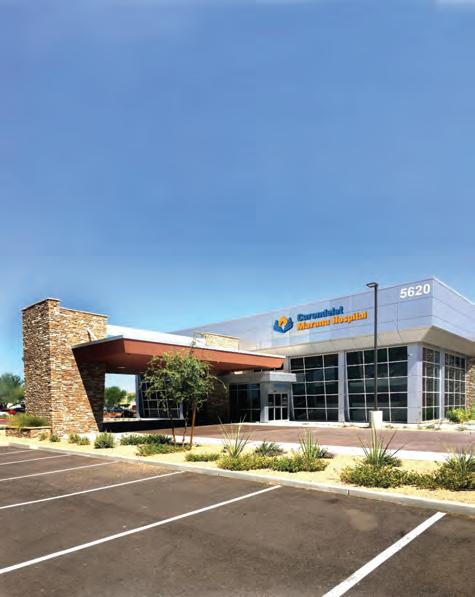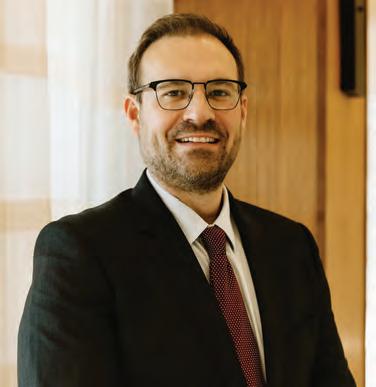










CELEBRATING 145 YEARS











By Christy Krueger
A contagious disease spreading through the U.S., a new railroad system, and the Sisters of St. Joseph of Carondelet all contributed to the founding of Arizona’s first hospital. St. Mary’s Hospital in Tucson. It opened in 1880 and is celebrating its 145th anniversary this year.
Tuberculosis, a potentially lethal bacterial lung disease, was considered the leading cause of death in the country during the 1800s. Many doctors sent their patients to the Southwest for its warm, dry climate with hopes of healing. And as luck would have it, the Southern Pacific Railroad arrived in Tucson the same year Carondelet St. Mary’s Hospital opened with 12 beds. Soon after,

the Sisters of St. Joseph of Carondelet created an isolation cottage at the hospital to receive the wave of tuberculosis patients arriving in Tucson.
The Sisters ran the hospital for many years, according to Father Showri, a Catholic hospital chaplain with Carondelet Health Network. “Carondelet’s impact on the community has been wonderful because of the Sisters. People flooded here and loved the care and affection.”
The priest’s historical notes indicate Carondelet St. Mary’s Hospital has always been in the same location, but it has undergone several reconstructions. “The wooden
continued on page 112 >>>
beams in and the doors of the chapel at St. Mary’s are from its original chapel; they’re historical, dating from the late 19th Century. There are pictures on the hospital walls from the 1880s and into the 1900s.”
In 1961, Carondelet St. Joseph’s Hospital was built on the east side, and by 2015, it had 480 beds, Showri said. “Before then, there was nothing there. In recent years, it became a Level 1 Trauma Center and added neurologi cal, neonatal, cardiology, and orthope dic services.”
In 2015, a partnership of three com panies took over Carondelet Health Network, but the hospital continues to welcome priests and nuns throughout the facilities. Chaplains are on call, priests are available for confessions and last rites, and there are family support counselors.
“Our volunteers play a huge role,” Showri said. “Carondelet Health Net work provides service to our commu nity, and our community of volunteers touch the lives of our patients and their loved ones daily. Volunteers’ activities range widely from answering phones to being a friendly face to help visitors and patients get where they need to go, they continue to make a positive impact on those who enter a Carondelet Health Network hospital. I’m proud to say that I was a volunteer in 2015.”
or nursing. There are also some high school students, who tend to work at both hospitals.
“As we approach our 145th anniversary in Southern Arizona, our volunteers play a pivotal role in making positive impressions on anyone who visits us,” Chartier said. “They’re the first face a patient or their loved one sees upon entering our hospital lobbies, often assist visitors arrive at their intended destina-

No matter the department, volunteers help ease the stress of being in a hospital.
Eva Jane Chartier is the Volunteer Services Coordinator for Carondelet St. Mary’s and Carondelet St. Joseph’s Hospitals, with approximately 80 volunteers who work weekly. Carondelet’s Holy Cross Hospital in Nogales has a small number of volunteers. According to Chartier, the volunteers are a diverse group. “At St. Joseph’s, our volunteers are individuals of all ages and backgrounds who want to give back or have a special tie to one or both hospitals. They typically work at the same hospital each week.”
who have been afforded a chance to live full lives. I am most proud of the people I work with everyday who bring their authentic selves to Carondelet.”
Some volunteers in ambulatory surgery help families follow their family member’s progression through surgery. “Loved ones are given a code and then they can track the surgery progress on TV screens that update them on the stage of their loved one’s surgery,” Chartier explained. “Maintaining open lines of communication with family members of our patients offers a sense of calm during an often stressful time in their lives. The care and compassion that volunteers show families makes a difference.”
Overseeing all areas and facilities of Carondelet Health Network is Market CEO Monica Vargas-Mahar, who chose healthcare as her career because she wanted to help people. And understands the positive impact Carondelet has had in the community, even years before she arrived.
“Countless lives have been saved, many thousands of babies born, hope and healing brought to people who have been afforded a chance to live full lives,” said Vargas-Mahar. “I am most proud of the people I work with everyday who bring their authentic selves to Carondelet.” She’s also proud of the partnerships that have developed in the community such as with El Rio Health.
Working in a hospital setting can sometimes be emotionally difficult. To boost morale, Carondelet’s leaders meet daily to share positive stories about the great patient care they witness. VargasMahar recalled a letter from a patient’s long-time friend who wrote, “I have seen, and firsthand experienced, many facilities in my life, but never have I experienced a place like yours. Your staff in an inspiration to me.”
According to Vargas-Mahar, Carondelet’s future includes providing the safest and highest quality care possible for the residents of southern Arizona by using the latest technological and medical advancements at all campuses.
Significant investments the organization has recently made include Carondelet St. Mary’s Hospital’s new da Vinci 5 robot, the first in Tucson; the CORI robot; and Farapulse technologies. Carondelet St. Joseph’s Aquablation, a continued from page 111
At Carondelet St. Mary’s Hospital, the majority of volunteers are college students with some being pre-med
– Monica Vargas-Mahar Market CEO Carondelet Health Network
continued on page 115 >>>


St. Mary’s Hospital, 1887 Tuberculosis Sanatorium, 1900s



In 1870, a group of seven Catholic Sisters from Missouri bravely set out on a mission to the untamed West to care for the people of Tucson.
The Sisters of St. Joseph of Carondelet – a congregation established in France in 1650 –were asked by the bishop of Tucson to leave their home in Carondelet, Mo. to teach in the barrios of Tucson and at Mission San Xavier del Bac.
The journey lasted a month. They were greeted at Picacho Peak by soldiers, who provided them safe passage into town.
On May 26, 1870, the Sisters arrived in Tucson, a town of a little over 3,000 souls. They were welcomed with celebrations and a fireworks display, and soon set up schools.

By Gabrielle Fimbres
A decade later, responding to the needs of the injured workers of the Southern Pacific railroad’s westward expansion, they were asked by the bishop to open Arizona’s first continuously operating hospital – St. Mary’s.
The 12-bed hospital was built in collaboration with the Tohono O’odham tribe, who helped the Sisters build the little hospital from rocks and boulders. St. Mary’s cared for its first patients on May 1, 1880.
Today, Carondelet celebrates 145 years after the Sisters’ journey to Tucson.
In an interview with BizTucson in 2013, Sister Irma Odabashian said the mission of the Sisters was strong.
“Our existence continues to be driven by the needs of the people we serve, which is our way of responding to the mission of Jesus – he taught, he healed, he counseled, he loved,” said Sister Odabashian, one of eight Sisters of St. Joseph of Carondelet.
The Sisters led the transformation from a small hospital on Tucson’s west side to the modernday Carondelet Health Network. They witnessed the growth of St. Mary’s, the addition of St. Joseph’s Hospital in 1961, Holy Cross Hospital in Nogales in 1981 and the many areas of specialization that thrive today.
This story originally appeared in the BizTucson Fall 2013 issue.


minimally invasive surgical procedure to treat benign enlarged prostate; a MAKO robot for orthopedic services.
Vargas-Mahar feels these technologies are major game changers in medicine.
“Robotic procedures can shorten a patient’s stay in the hospital, lessen post-operative pain and lead to faster recovery times.” Cardiologists are using a new handheld imaging system that allows them to see how well the patient’s blood is flowing.
Carondelet Health Network is also investing in partnerships aimed at advancing surgical care in Tucson and Southern Arizona.
Last year, five local surgeons -- Dr. Katie Artz, Dr. Tiffany Son, Dr. Joseph DeVitis and Dr. Kelly Favre – joined Carondelet Medical Group and created their new practice, Carondelet Medical Group –Surgical Specialists. This medical group expands access to services needed in our community. Together, Carondelet Medical GroupSurgical Specialists is better able to meet the surgical needs of the community by offering collaborative care and surgical treatment options – all in one convenient location.
To recognize how far Carondelet has come and the importance of all who have helped it grow, associates have been enjoying special events and receiving 145th anniversary items.
“Our chapels have had renovations in preparation for this momentous occasion, recognizing that they are truly places of healing and peace,” Vargas-Mahar said. The hospitals will also be receiving a special blessing from the Roman Catholic Diocese of Tucson.
“The foundation of a great community is built by the very people who each day work to make it a better place for future generations,” Vargas-Mahar said. “It took people to make our 145th anniversary a reality, so we are celebrating our people leading up to and after the special day.” Biz



Cardiovascular
Comprehensive Stroke Center
General Surgery
Level One Trauma Center/Emergency Room
Neurology/Neurosurgery
Orthopedics
Pulmonology
Urology
Women’s Services – NICU, Obstetrics, Gynocology
Bariatric Surgery
Cardiovascular
Emergency Room
General Surgery
Inpatient Behavioral Health Services
Inpatient Rehabilitation
Neurology
Orthopedics
Outpatient Wound Care
Pulmonology
Stroke Treatment
Urology




By Tara Kirkpatrick
When Monica Vargas-Mahar joined the Carondelet Health Network in 2021, it was a critical and volatile period for the healthcare industry. Like the rest of the world, Southern Arizona was slowly emerging from the COVID-19 pandemic.
Vargas-Mahar, armed with more than two decades in healthcare administration with Tenet Healthcare, got straight to work providing solid leadership for Carondelet St. Joseph’s, Carondelet St. Mary’s Hospital, Carondelet Holy Cross Hospital, Carondelet Marana Emergency Center and the St. Raphael Emergency Center.
She forged strong community connections, joining the board of United Way of Tucson and Southern Arizona and serving as its campaign chair in 2023. Vargas-Mahar also was chair for the National Association of Latino Healthcare Executives, an organization she has long supported.
As Carondelet celebrates an inspiring 145 years in the region, BizTucson asked Vargas-Mahar to reflect on the hospital’s legacy and its promise moving forward.
Carondelet Health Network has made an indelible impact on Tucson, Southern Arizona and the entire state over the past 145 years. Our hospitals have brought life-saving care to our community, broken ground with medical advancements, and expanded care to meet the needs of our neighbors. Like the Sisters of St. Joseph of Carondelet, who started our mission to make life better for those living here, we are driven by a deep desire to make positive change. Every day, our hospitals continue that mission. Today, we improve lives through advancements in healthcare and medical technology that are truly inspiring. We are here to make our community even better than it was yesterday. Our investment today is the seed for the future and also the very foundation for which generations to come will flourish and thrive. I look forward to what we’ll do in the decades to come.
on page 118
continued from page 117
What are you most proud of in terms of the care Carondelet Health Network offers?
I am motivated and humbled each day by the strong and inspiring people that I am surrounded by at Carondelet. Nurses, physicians, technicians - hospitals full of people who dedicate their lives to care for their neighbors. It’s these people who make Carondelet such an exceptional place to receive care, working tirelessly to bring hope and healing to everyone who walks through our doors. Our team is committed to driving quality, safety, and patient experience on behalf of the people who put their trust in us, who count on us in some cases, during the most difficult time in their lives.
I am also proud to be part of a hospital system with such a rich history. Start-
ing with opening the first hospital in Arizona, the amazing legacy the Seven Sisters have left on Southern Arizona is truly remarkable. Continuing their work and mission to provide the best care possible to those who need it in our community is a privilege and responsibility that I don’t take lightly.
Carondelet will continue to bring advancements in care and expanded services for our patients. But it’s not just about the latest technology, surgery, or therapy. I believe it’s also important to grow and mentor the next generation of healthcare leaders. We have a responsibility to guide and advance the careers of young executives, nurses, physicians and others in the healthcare industry, to encourage people to enter the healthcare field. In this way, we can help to
ensure a strong and healthy future for the people who come behind us.
Why do you enjoy working with the United Way of Tucson and Southern Ar izona?
Giving back to the community is important to me. Being part of uniting people, ideas, and resources together for the greater good – and knowing that together, we’re making a difference. All of these things fuel my passion to support this organization. The foundation of a great community is built by the people who each day work to make it a better place for the generations of the future. My family and I are proud and honored to call Tucson home and feel blessed to be a part of supporting an organization that brings community resources to more than 420,000 people each year. We are a community built on care.



By Tara Kirkpatrick
In partnership with another venerable and historic organization that meets the needs of our times, Carondelet Health Network has joined with El Rio Health to offer behavioral health services for patients 18 years old and older.
Beginning last October, psychiatric inpatient services were made available at Carondelet St. Mary’s Hospital and on-call coverage was offered at Carondelet St. Mary’s and St. Joseph’s Hospitals.
The result is a comprehensive continuum of care for people in need.
“Our two organizations have been working to care for these patients for decades and together we bring an impressive solution for the community’s behavioral health needs,” said Monica Vargas-Mahar, Market CEO of Carondelet Health Network.
According to the Centers for Disease Control and Prevention, more than one in five U.S. adults lives with a mental illness. Fifty-seven million people visit physician offices each year with mental disorders as the primary diagnosis, and 5.8 million people wind up in hospital emergency departments every year for treatment of mental disorders and behavioral issues. A 2021 study reported by Making Action Possible for Southern Arizona, an organization aimed at fostering quality of life improvement, noted Tucson residents report 5.2 poor mental health days per month.

Behavioral Health’s experts engaging with our staff and available 24/7 for behavioral health emergencies at the Carondelet Health facilities.”
–
Dr. Brian Hess Chief Medical Officer Carondelet Health Network
El Rio Health cares for approximately 10% of Tucsonans and has been in the community since 1970, said Dr. Brian Hess, Chief Medical Officer of Carondelet Health Network. “As such, they have significant behavioral health resources and have been a natural and successful partner for our behavioral health unit and across our network of hospitals in Southern Arizona.”
“We are pleased to have El Rio Behavioral Health’s experts engaging with our staff and available 24/7 for behavioral health emergencies at the Carondelet Health facilities,” Hess continued.
“We are working through our collective channels and outreach to ensure those that have a behavioral health need can access our services, at any time, through our emergency departments or direct admission to care for any behavioral health need including substance use and dependency.”
Hess said leaders from both respected health organizations meet daily to discuss and assess best practices.
“Our patients have given us wonderful feedback that the care we provide is exceeding their expectations, and we have had great success early in this behavioral health collaboration,” Hess said.


